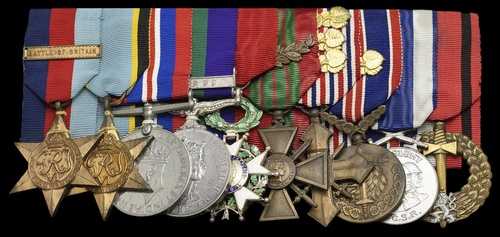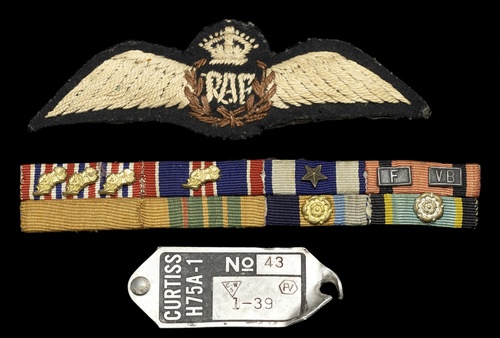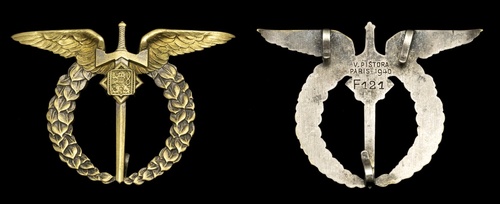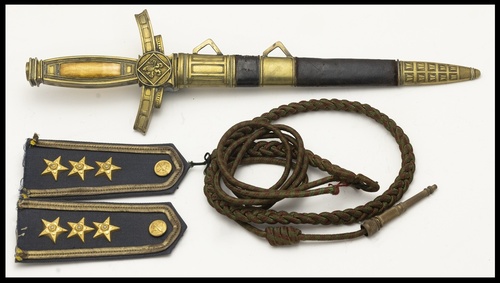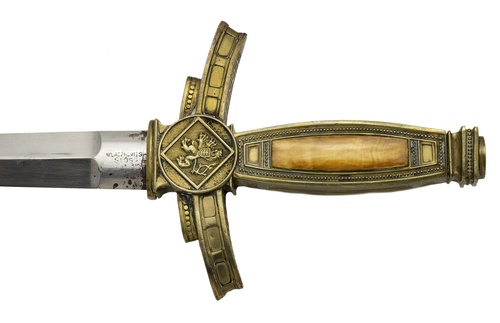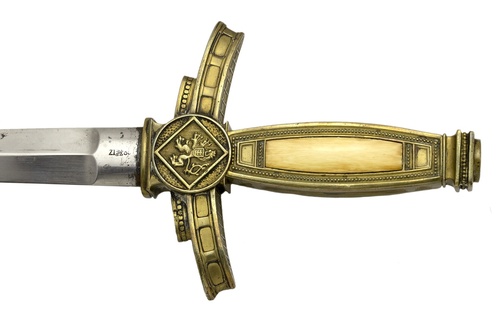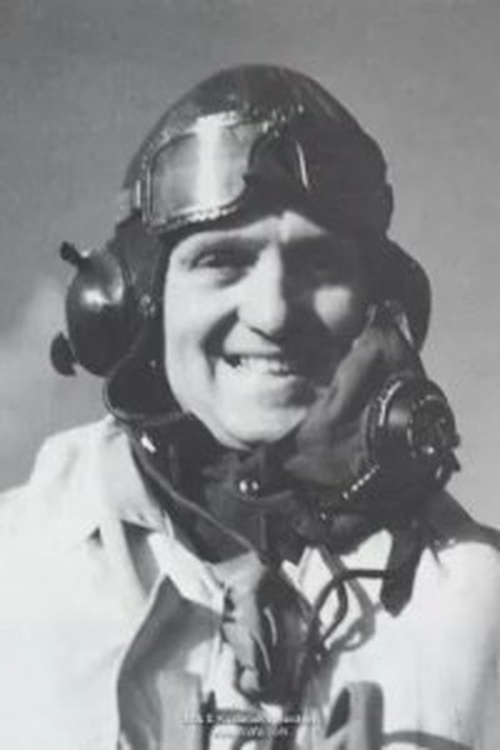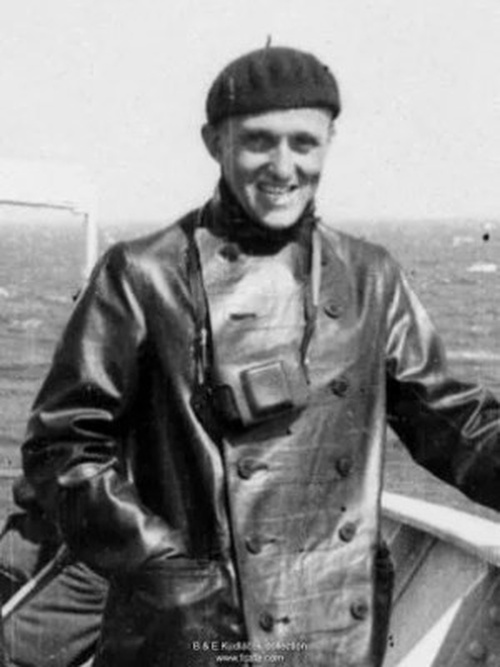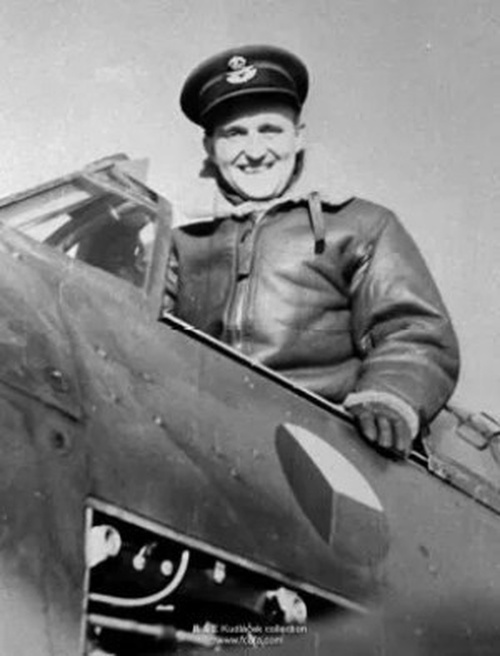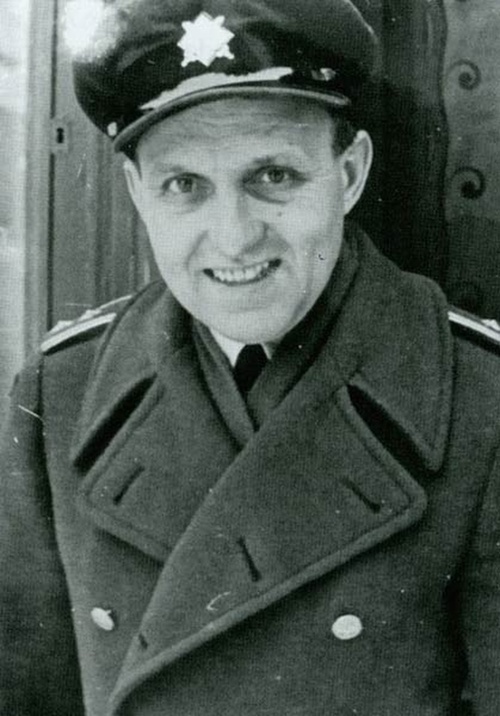Auction: 25001 - Orders, Decorations and Medals
Lot: 99
Sold by Order of a Direct Descendant
The outstanding Czech War Cross & Czech Bravery Medal group of ten awarded to Flight Lieutenant A. Vrana, Royal Air Force, late Czech Air Force and French Foreign Legion l'Armee de l'Air Groupe de Chasse 1/5
Vrana had the admirable record of one kill and two probables during the Battle of France, having then transferred to Britain, he flew in the Hurricanes of No. 312 (Czechoslovak) Squadron during the Battle of Britain as just one of just 88 Czech Pilots
1939-45 Star, clasp, Battle of Britain; Air Crew Europe Star; War Medal 1939-45; General Service 1918-62, 1 clasp, Cyprus (Flt. Lt. A. Vrana. R.A.F.); France, Republic, Legion of Honour, silver and enamel; Croix de Guerre, reverse dated '1939', with Palme upon riband; Czechoslovakia, Republic, Czechoslovak War Cross 1939, with three further Award Bars; Bravery Medal, with Second Award Bar; Military Merit Medal, silver; Army Commemorative Medal, 1st Type, mounted court-style as worn by Spink & Son, St James's, London, good very fine (10)
Adolf Vrana - or Ada to his friends and comrades - was born at Nová Paka, Bohemia in October 1907. Having come of age, Vrana undertook his national military service and joined the Czechoslovak Air Force. First in the ground crew at Prague-Kbely and Hradec Králove fields, he was then selected for Pilot training. Vrana passed though in 1931 and was assigned to the 41st Fighter Squadron as a fighter pilot.
He further gained skill in night flying, observation and also qualified on seaplanes, going to the Hranice Military Academy in 1934. Made Pilot Officer in 1936, he was with the 91st Squadron, at that time the only night fighter Squadron. Vrana thence trained as an instructor and a test pilot.
Following the Nazi occupation of Czechoslovakia in March 1939, all its personnel found themselves without employment. Thus Varan and many of his colleagues made a break for it, arriving to the Consulate in Krakow some months later. The plan would be to make for Franch, which was completed via a coastal cruiser that took him to Calais.
The French Foreign Legion was the option open, with the understanding that should a Second World War be declared, those in the service would then join Regular French Units. Some who had joined were fortunate to be transferred onto the most usual postings in Africa which were commonplace with the Foreign Legion, Vrana was still in France when War was declared. He was duly released to the l'Armée d'Air and went out to Chartres air field.
Battle of France - first blood
Having undergone familiarisation with the French systems and aircraft, Vrana operated the Curtiss Hawk 75 from Suippes, near Rheims with the Groupe de Chasse 1/5.
The Battle of France saw Allied airmen gain significant experience in aerial combat, which would come to the fore in a few short months. Vrana wasn't to know that at the time, for they were regularly 'scrambled' to action on multiple occasions. Of his own record, Vrana was shot down on 13 May 1940 by a Me109, his life being saved by parachute after having bailed out. He shared in the destruction of a He111 on 26 May 1940 and shared in the probable destruction of a Hs126 and a He111 on 7 June 1940. As the German advance came on apace, the Group found itself moving to safety on numerous occasions.
After the French collapse, Vrana and other Czechs flew their Hawks from Clermont-Ferrand to Algiers on 17 June. They made their way to Oran, at that point learning that France had fallen. Whilst at that place, together with four other gallant airman, Vrana was presented with his two French awards for his gallantry during the previous period of action. They then went to Casablanca, from where they went by boat to Gibraltar, where they joined a convoy bound for Britain, answering the call of Churchill that they would be welcomed to Britain to continue the fight.
Battle of Britain
Processed into the Royal Air Force, he joined No. 312 (Czechoslovak) Squadron at its formation at Duxford on 29 August 1940. They were to be equipped with Hurricane Mark I's. They moved to Speke in September as part of the defence of Liverpool and her precious docks.
Of his Ops with No. 312 Squadron, the Operational Record Books provide the following, all 'Scrambles':
'21 October - P3810 1135hrs.
22 October - P3810 1620hrs.
24 October - V6810 1310hrs.
22 November - V6926 1040hrs.
26 November - V6926 1155hrs.
27 November - V6926 1625hrs.
28 November - P3612 1250hrs.
5 December - P3759 1120hrs.'
Further flights
Besides this, Vrana then assisted in transferring four of their aircraft on 8 December and would have been back in time for the visit of the Czech President on 17 December, who toured the Squadron and met the Pilots. At the end of his operational tour in April 1941, Vrana was posted to 3 ADF at Hawarden. Variously serving with No. 310 Squadron at Martlesham Heath in the Operations Room as a Flight Control Officer, he returned to No. 312 Squadron for a further Operational Tour in June 1942. Tour expired the following year, Vrana then went to serve at the Czechoslovak Inspectorate General and as Czechoslovak Liaison Officer at HQ Fighter Command, Bentley Priory.
Returned to his homeland at the end of the conflict, he learned that his parents were lucky indeed to have survived time in a Concentration Camp. He rejoined the Czech Air Force when it was being rebuild and became Commanding Officer of the Research Institute and Testing Unit. His Czechoslovak War Cross 1939 with Three Bars followed in September 1945, being promoted to Lieutenant-Colonel and Commander at Prague-Kbely field. When the communists took over in February 1948, he saw the way in which those who had served the Allied forces treated. It was clearly not a risk he wanted to take and Vrana escaped with his wife. Having been granted leave from the Air Force, he made it across to West Germany in late 1949. Vrana once again returned to the United Kingdom and rejoined the Royal Air Force. Having seen further campaign service in Cyprus (Medal & clasp), he retired Flight Lieutenant in May 1961. Granted the rank of Colonel in the Czechoslovak Air Force, he died in Wiltshire on 25 February 1997.
His name is recorded on the National Battle of Britain Memorial and the London Battle of Britain Memorial, besides a memorial plaque in his home town and upon the Winged Lion Monument at Klárov, Prague.
Sold together with an impressive archive of original material comprising:
i)
His riband bar, removed from his uniform, with gilt rosette upon 1939-45 Star denoting 'Battle of Britain'.
ii)
His R.A.F. Pilot's 'Wings'.
iii)
Czech Air Force Epaulettes.
iv)
Czech Pilot's dagger, marked 'Wlaszlovits, Stos', brass hilt with inlay, brass and leather scabbard, the blade of steel.
v)
Croix de Guerre aiguillette.
vi)
Data plate removed from an aircraft, marked 'Curtiss H75A-1 No. 43 1-39'.
vii)
Czech Pilot's Badge, by V. Pistoira, Paris, 1940, a rare award of French manufacture, numbered to the reverse 'F121'.
With thanks to Simon Muggleton for accessing the ORB's.
Subject to 20% VAT on Buyer’s Premium. For more information please view Terms and Conditions for Buyers.
Sold for
£8,500
Starting price
£5500
Sale 25001 Notices
Now offered together with his French Pilot's Badge, this officially numbered '33644', photographs available via SpinkLIVE.

